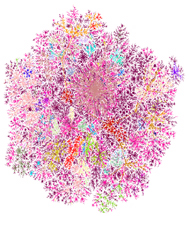 The Pew Internet & American Life project’s recent report, The Future of the Internet, surveys the opinions of a broad assortment of scholars, web pioneers and technophiles on where they think the Internet is headed over the coming decade. Partnering with the Pew project, Elon University is running a related initiative, Imagining the Internet, which “examines the potential future of the Internet while simultaneously providing a peek back into its history.” The centerpiece of this project is a “Predictions Database,” pooling the prognostications of web luminaries and average joes alike. A great resource.
The Pew Internet & American Life project’s recent report, The Future of the Internet, surveys the opinions of a broad assortment of scholars, web pioneers and technophiles on where they think the Internet is headed over the coming decade. Partnering with the Pew project, Elon University is running a related initiative, Imagining the Internet, which “examines the potential future of the Internet while simultaneously providing a peek back into its history.” The centerpiece of this project is a “Predictions Database,” pooling the prognostications of web luminaries and average joes alike. A great resource.
Pew and Elon aren’t the only ones talking about that slender ten-year slice known as the history of the Internet. A conference next week in Amsterdam at The Institute of Network Cultures will be spending two days discussing “a decade of web design.” Future of the Book will be coming to you live from the conference.
Pew participants more or less agreed on a few broad projections: that publishing and the news will undergo further dramatic change as blogs and other web phenomena continue to break apart and redefine the mass media structures of the past century (see also the Pew report on blogging); that “the Internet will be more deeply integrated in our physical environments and high-speed connections will proliferate – with mixed results”; and that network infrastructure will likely suffer a major attack.
 This last point is echoed in another recent speculative work, in this case, a work of fiction by former white house counter-terrorism chief Richard Clarke in the latest issue of The Atlantic Monthly (which annoyingly isn’t readable on the web without subscription). The story, titled Ten Years Later, is a concocted transcript of the Tenth Anniversary 9/11 Lecture given at the Kennedy School of Government in Cambridge. If you like having nightmares, go read this piece. At this imaginary lectern, Clarke delivers a hellish litany of terrorist attacks and domestic security crackdowns, painting an America even more paranoid and locked-down than the one we live in now. Among his grim predictions is “virtual war” in 2008 in the form of a “Zero Day worm” launched by Iran in cooperation with al-Qaeda which effectively shuts down the US economy.
This last point is echoed in another recent speculative work, in this case, a work of fiction by former white house counter-terrorism chief Richard Clarke in the latest issue of The Atlantic Monthly (which annoyingly isn’t readable on the web without subscription). The story, titled Ten Years Later, is a concocted transcript of the Tenth Anniversary 9/11 Lecture given at the Kennedy School of Government in Cambridge. If you like having nightmares, go read this piece. At this imaginary lectern, Clarke delivers a hellish litany of terrorist attacks and domestic security crackdowns, painting an America even more paranoid and locked-down than the one we live in now. Among his grim predictions is “virtual war” in 2008 in the form of a “Zero Day worm” launched by Iran in cooperation with al-Qaeda which effectively shuts down the US economy.
Scary stuff, but probably important to keep in the back of one’s mind as we try to imagine the future of books and communication in the digital era. Technology does not develop in a vacuum, nor does culture. Think of the massive creative response to the wars that ravaged the earth in the twentieth century. How will artists and culture as a whole respond to the ravaging of a virtual world that is increasingly as real as the material one?
if:book
A Project of the Institute for the Future of the Book
